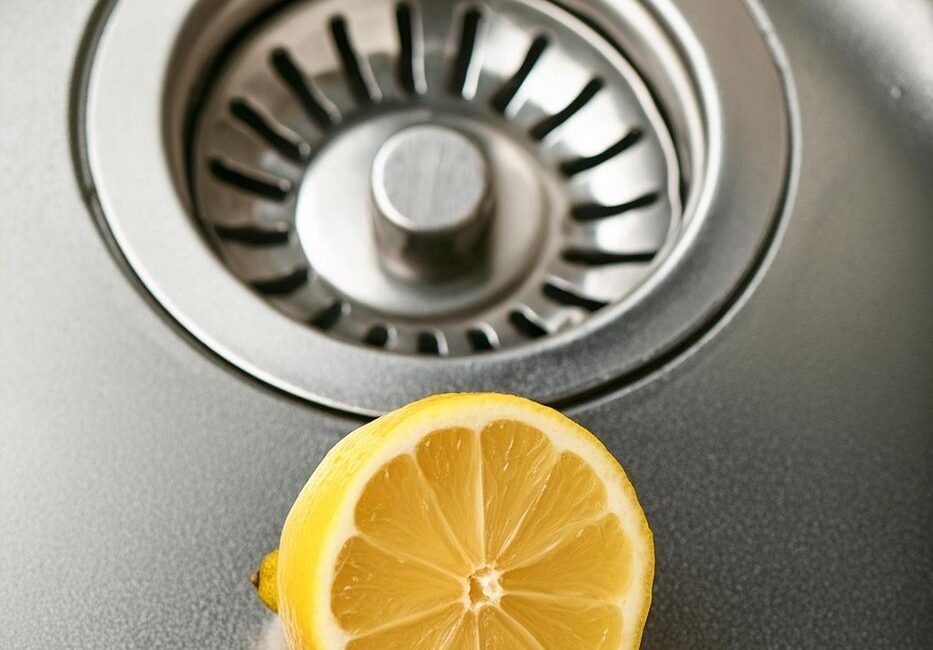Garbage disposals are often the unsung heroes of modern kitchens, quietly working behind the scenes to prevent food waste from piling up in landfills. However, alongside their effectiveness, these appliances can attract unpleasant odors over time, turning your kitchen from a beautifully fragrant space into an unpleasant olfactory experience. Fortunately, there’s a simple solution that’s been within reach all along: the humble lemon. While many people might toss lemon peels into their disposals for a quick odor-fighting fix, few know the best practices to maximize its benefits. In this article, we’ll delve into the profound benefits of using lemon to freshen your garbage disposal and guide you on how to do it right.
Understanding Garbage Disposal Odors
Before we explore the magic of lemons, let’s understand why garbage disposals are prone to developing bad smells. When food particles accumulate in the disposal and pipes, they can lead to the growth of bacteria. These bacteria thrive on decomposing organic matter, producing foul odors that can waft up through your kitchen. In addition, foods like onions, garlic, and even some fish can contribute to an unpleasant smell, making it essential to clean your disposal regularly.
The Lemon: Nature’s Deodorizer
Lemon has long been celebrated for its cleansing properties, which come from its high acidity and antimicrobial properties. Lemons contain citric acid, which can break down stubborn residues and neutralize odors. Moreover, the refreshing scent of lemon can instantly uplift the atmosphere in your kitchen. However, using lemon the correct way is crucial to harness its full potential.
Common Mistakes in Using Lemons
Despite their promise, many people make common mistakes when using lemons to clean their garbage disposals. Here are a few:
- Just Tossing in Whole Peels: While putting in whole lemon peels may release some fragrance, it’s often not enough to combat deeper odors or residues. The larger pieces can also get stuck, leading to more plumbing issues.
- Using Lemon Juice Alone: Some might think that pouring lemon juice directly down the disposal is enough. Although effective as a quick fix, it doesn’t address any buildup that may be causing the odor.
- Not Following Up: It’s not enough to toss in a lemon every once in a while; consistent maintenance is key to getting the most out of your disposal.
The Right Way to Use Lemon in Your Garbage Disposal
To effectively utilize lemons for a fresher-smelling garbage disposal, consider following these steps:
- Cleaning with Lemon Ice Cubes: One of the most effective methods is to freeze lemon juice in ice cube trays. Once frozen, you can run a few lemon ice cubes through the disposal. This method not only introduces the citrusy scent but also helps scrape the walls of the disposal as they grind up.
- How to Make:
- Squeeze fresh lemons until you have about 1-2 cups of juice.
- Pour the juice into ice cube trays and freeze overnight.
- Once frozen, pop a few cubes out and feed them into the disposal, followed by cold water.
- With Baking Soda: Combining lemon with baking soda can create a powerful cleaning solution. The baking soda helps absorb odors while the lemon complements it with its fresh scent.
- How to Do It:
- Start by pouring about half a cup of baking soda directly into the disposal.
- Follow with a cup of lemon juice, which will create a fizz that helps loosen grime.
- Let it sit for 10-15 minutes, then run cold water while the disposal is on.
- Regular Maintenance: Incorporate lemons into your regular cleaning schedule to maintain freshness. Depending on how often you use your disposal, consider using lemon ice cubes or a lemon-baking soda mixture every few weeks to keep the odors at bay.
- Lemon Slices with Ice: If you don’t want to deal with the prep work of making lemon ice cubes, you can also throw in a few lemon slices combined with ice. The ice will sharpen the blades and clean the disposal, while the lemons will impart a refreshing scent.
- Essential Oil Bonus: For an even more fragrant experience, you can add a few drops of lemon essential oil along with your lemon methods. Essential oils are highly concentrated and can add that extra zing to your kitchen.
Alternative Uses for Lemon in the Kitchen
Lemon can be a multi-tasker beyond just freshening up your disposal. Here are additional ways to utilize lemons for cleanliness and fragrance in your kitchen:
- Cleaning Surfaces: The acidity in lemons makes them an excellent natural cleaner. Squeeze lemon juice onto cutting boards and countertops to sanitize and deodorize while also leaving a fresh scent.
- Freshen the Refrigerator: Place a bowl of lemon juice or simply a few lemon peels in your refrigerator to combat stale odors.
- Dishwashing Aid: For those who hand wash dishes, adding lemon juice to your soapy water can help cut grease and leave your dishes looking sparkling clean.
- Detoxifying Fruits and Vegetables: Use a lemon-water solution to soak your produce, which can help remove pesticides and other residues while adding a fresh scent.
- Scenting the Air: Boil lemon slices in water on the stove to naturally deodorize your kitchen and create a warm, inviting atmosphere.
Beyond the Kitchen: The Health Benefits of Lemons
While we focus on the immediate practical benefits of using lemons in our kitchens, it’s also worth noting that lemons offer an array of health benefits, making them a fantastic addition to your diet:
- Rich in Vitamin C: Lemons are known for their high vitamin C content, which is crucial for immune function and skin health.
- Hydration: Adding lemon to your water can make it more palatable, especially if you struggle to drink enough fluids throughout the day.
- Promotes Digestion: Lemon juice can aid digestion, detoxify the liver, and may even support weight loss.
- Antioxidant Properties: The various phytochemicals present in lemons have protective effects against free radicals, contributing to overall health.
Conclusion
Harnessing the power of lemon in the quest for a fresh-smelling garbage disposal isn’t just a simple fix; it’s a comprehensive approach to maintaining a clean and inviting kitchen. With its natural acidity, antimicrobial properties, and delightful fragrance, lemon is indeed a powerhouse when it comes to kitchen cleanliness. By avoiding common pitfalls and utilizing the fruit wisely, you’ll not only keep those unpleasant odors at bay but also enjoy the other numerous benefits that lemons have to offer. So next time you find yourself facing a stinky disposal, remember: the key to freshness might just be waiting on your counter. Embrace this zesty solution and transform your kitchen into an oasis of cleanliness!




